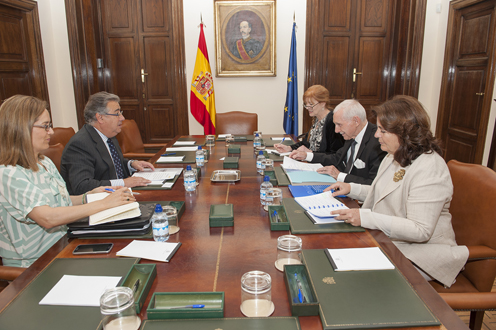Bilateral Spain-IOM meeting
Juan Ignacio Zoido meets Director General of International Organisation for Migration (IOM), Ambassador William Lacy Swing
News - 2017.5.9
Juan Ignacio Zoido was accompanied at the meeting by the Director-General for International Relations and Immigration, Elena Garzón.
The International Organisation for Migration (IOM) is an inter-governmental organisation set up in 1951 under an international treaty and is currently made up of 127 Member States, including Spain.
The partnership between the Ministry of Home Affairs and the IOM is focused on assisted voluntary return and reintegration (AVRR) programmes from third countries in compliance with the commitments made to Europe aimed at tackling the refugee crisis (Relocation and Resettlement).
Juan Ignacio Zoido and William Lacy Swing discussed various issues related to migratory flows and the voluntary return programmes Spain has been supporting since October 2013 by financing the necessary travel costs for the voluntary return of illegal immigrants to their countries of origin from Morocco.
The Minister for Home Affairs informed the Director General of the IOM that, to date, the Ministry of Home Affairs has made four economic contributions totalling 800,000 euros, the last of which was in 2015. In light of the results obtained, Juan Ignacio Zoido stressed that Spain plans to maintain this collaboration in 2017.
A total of 8,246 immigrants from 36 countries have benefited under this voluntary return programme between the start of the project in 2005 and December 2016. The main countries of origin of those immigrants who received this assistance are Guinea-Conakry, Cameroon, Senegal, Ivory Coast and Mali. Besides Morocco, the countries currently working on this project are: Spain, Belgium, Italy, the Netherlands and Switzerland, together with the European Union.
AVRR project by the IOM in Mauritania
The Minister for Home Affairs, Juan Ignacio Zoido, told the Director General of the IOM, Ambassador William Lacy Swing, that, as is the case with Morocco, Spain also helped Mauritania in 2016 with a voluntary contribution of 50,000 euros to finance the costs associated with the return trip by immigrants and plans to make another contribution this year.
A total of 71 immigrants have received assistance from the IOM since the start of the programme in January 2016 and December 2016. The main countries of origin of the immigrants are Ivory Coast, Sierra Leone, the Democratic Republic of Congo, Cameroon and Senegal.
Relocation and resettlement in Spain
Juan Ignacio Zoido thanked William Lacy Swing for the support and collaboration being provided by both the UNHCR and IOM, and said that the Government of Spain has been working since the outset to ensure that the relocation and resettlement commitments made to the European Union can be met within the time required and under the right conditions.
The Spanish minister said that, to date, 1,304 refugees have been transferred to Spain: 886 have arrived through relocation programmes (742 from Greece and 144 from Italy) and 418 have arrived through resettlement programmes (232 from Lebanon and 186 from Turkey). Juan Ignacio Zoido told the leader of the IOM that the commitment made to the EU will be maintained over the coming months in order to relocate 600 additional applicants.
In terms of resettlement, Juan Ignacio Zoido said that the 2015 National Resettlement Programme (with a commitment of 854 refugees) was launched in 2016 and is expected to conclude in the coming months.
As regards the 2016 National Resettlement Programme, which includes 725 places to be provided during 2017, the Minister for Home Affairs announced that it will lead to 100% compliance with the commitment made to Europe (with the resettlement of 1,449 refugees in Spain). In order to implement this programme, Juan Ignacio Zoido recalled that Spain formally notified the UNHCR in late March of its willingness to resettle 400 refugees from Turkey and 325 from Lebanon this year.





